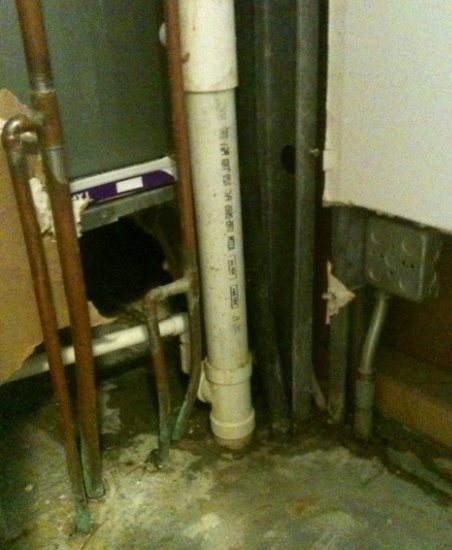Find a Mold Specialist Now
Click or Call, Toll-Free 24/7
Stop Water Leak
It’s important to stop a water leak as soon as you discover the leak. A water leak can drive your water bill up and over time, can cause structural damage to your home. For instance, a leaky toilet can lead to warped floorboards or even floorboards that are too weak to safely support your weight. In addition, water leaks create the ideal environment for mold, which likes dark, damp places. Fixing water leaks promptly saves you money, prevents structural damage to your home, and protects you from exposure to mold that can be hazardous to your health.
Do You Have a Water Leak?
The Environmental Protection Agency suggests a simple way to check for a water leak. Look at your water meter and write down the number. Don’t use any water at all for two hours. Then look at the water meter again. If it’s moved at all, that probably means you have a leak.
Of course, then you’ll need to search for the leak so that you can fix it. Look under sinks, check the water supply to your dishwasher and washing machine, and don’t forget to check outdoor facets, as well. In addition to looking for water in these areas, look for mold, which commonly develops in damp areas. If you smell a musty odor, that’s often an indication of mold. Check the entire house for leaks.
Fixing Water Leak
Now that you’ve located any water leaks in your home, it’s time to stop the water leak before it leads to significant problems. Some leaks are easier to fix than others, though, depending on where they are located.
Most homeowners can replace worn washers or gaskets on leaky faucets themselves. If you go to a hardware or home improvement store for parts, employees can usually provide information and advice about how to do the job. If you’re not sure how to do it, though, call in a plumber. Don’t just ignore a leak because you aren’t sure how to fix it.
Leaky showerheads can often be repaired with pipe tape. Just wrap the tape around the leaky connection. If that doesn’t work, you may need to replace the showerhead. Again, many homeowners are able to do that themselves and you can get some free advice at your local home improvement store, but call in a plumber if you need help.
If your water meter suggests you have a leak but you can’t find it, we recommended calling in a plumber. Hidden water leaks spell big trouble. If, for instance, a pipe is leaking inside a wall, it might not be apparent until the wall is significantly damaged. That’s messy and expensive to fix, plus there’s a good chance of mold developing in the wall before you notice the problem.
After You Stop Water Leak
Once you’ve fixed a water leak (or had it fixed by a plumber), repeat the test where you look at your water meter, write down the numbers, wait two hours without using any water and then look at your meter again. That way you can be sure you’ve fixed the leak and that there are no other leaks you haven’t located yet.
When you’re repairing a water leak, inspect the surrounding area carefully for mold. Water leaks don’t always lead to the growth of mold but they often do. If it looks like water has been leaking for a good while, you might benefit from having someone test your home for mold, even if you don’t see any. Mold can grow in places that are difficult to see, like inside walls and under floorboards. To find certified mold testers near you, follow the link.
Of course, if you do find mold, you’ll need to remove it since exposure to mold spores can make you sick. We suggest scheduling a free in-home consultation with a mold removal professional to discuss your situation. Here you can get a list of experienced mold removal professionals near you.
Return From Stop Water Leak To What Causes Mold In A House
Black Mold Health Symptoms Home Page





